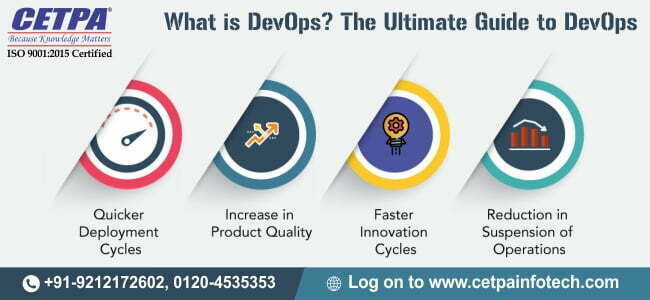What is DevOps? The Ultimate Guide to DevOps

DevOps is the new buzzword in the IT field, following Agile and Scrum. DevOps is a combination of software development techniques that combine software development (Dev) and IT operations (Ops) to enable the delivery of features, bug fixes and updates more frequently – all of which are aligned with business requirements. In simple language, we can say that DevOps cuts down the software development life cycle timeline.
In this blog we have described everything you want to know about DevOps:
DevOps processes
DevOps itself includes the regular software development life cycle steps, in the following order.
- Coding:Code development and review, source code management tools and code merging
- Building:Continuous integration tools and build status
- Testing:Continuous testing tools that provide feedback on business risks
- Packaging:Artifact repository and application pre-deployment staging
- Releasing:Change management, release approvals and release automation
- Configuring:Infrastructure configuration and management, as well as ‘infrastructure as code’ tools
- Monitoring:Applications performance monitoring and end user experience
Qualification Required for DevOps Jobs
If you are aspiring to make a career in DevOps, you must be strong in the concepts of the software development life cycle, including software development basics and automation testing fundamentals. In order to proceed further, you must join DevOps Training in Noida, which will help you in clearing your practical skills.
What makes anyone an ideal DevOps engineer?
Apart from day-to-day regular DevOps skills, one must possess the following skills to stand ahead of the crowd.
Flexibility: Ideal DevOps engineers should be flexible enough to change and adapt to the new evolving practices.
Security skills: DevOps works on a shorter cycle of development and deployment of code, which makes it vulnerable to security threats. As a DevOps engineer, you should not compromise on the security of the application.
Collaboration: As a DevOps engineer, one should work collaboratively within a team, making the process cross-functional.
Scripting skills: It’s obvious that you must know how to code in different programming languages, such as JavaScript, PHP, Python, etc, but also knowing how to write code to automatically assign IP addresses or DNS codes will definitely win the battle.
Decision making: Faster delivery implies that you must take critical decisions within a shorter time span without making too many iterations or changes.
Infrastructure knowledge: In order to know the system in-depth and understand each bit of the work being done, having the right infrastructure knowledge will enable a DevOps engineer to design and deploy applications effectively using the best possible platforms.
How to make career in DevOps?
Are you seeing DevOps in your future? Then you can join CETPA Infotech, which provides live project based course in Noida. After completion of training, you will also get 100% Placement assistance.



